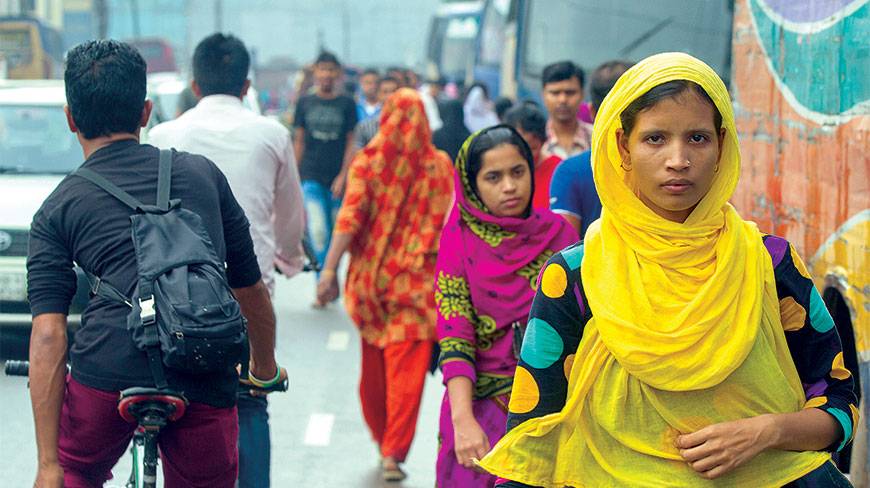Relocating over one thousand readymade garment factories from Dhaka to outlying areas may help ease some of the severe problems faced by residents of the capital city, including chronic traffic jams and environmental
pollution.
If such a plan were to be implemented, at least 15 lakh people, mostly RMG workers and their dependents, would be forced to move out of the overcrowded city, reducing ever-increasing pressures on it, according to data of the Department of Inspection for Factories and Establishments.
They estimated that around 1,027 RMG units, employing nearly five lakh workers, are located in the capital, while there are 533 factories with about 3.48 lakh workers in Savar and Ashulia.
The survey was conducted among 1,560 factories in Dhaka district.
Talking to several workers, this correspondent found that each one lived with at least three other family members _ meaning nearly 15 lakh of the capital’s 150 lakh inhabitants are here due to the presence of RMG factories.
Among city areas, the highest number of workers live at Mirpur, which has 274 RMG factories, employing over 1.26 lakh people. Kafrul comes in second with 43,241 workers, followed by Tejgaon industrial area with 33,172 workers. Uttara, including Uttarkhan and Dakhhinkhan, has nearly 74,000 workers.
According to the Bangladesh Garment Manufacturers and Exporters Association (BGMEA), 34% of RMG factories need to be relocated from the capital.
The apex trade body of the export-oriented sector has already signed a memorandum of understanding with China to establish a garments “palli” (village) in Munshiganj district for relocating RMG units, officials said.
“Most owners of factories housed in shared buildings want to relocate from the capital, but they are worried about getting connections for utility services,” BGMEA vice president Shahidullah Azim, told the Dhaka Tribune recently.
Azim said they had taken the initiative to relocate factories, but the process requires time and money.
He also urged the government to provide easy terms loans for relocation, adding that vulnerable factories would be shifted first, followed by units located in rented commercial or residential buildings, and finally, those that share industrial buildings.
“Most of the factory owners are busy in making their factories compliant, that is why relocation is taking time,” Abdus Salam Murshedy, managing director of Envoy Group, told the Dhaka Tribune.
Lack of suitable space, access to workers and power connectivity were major obstacles in relocating RMG units, he added.
“To avert problems in the future, the government should make a plan for the relocation of factories,” said Nazrul Islam, chairman of the Centre for Urban Studies.
The plan should include details of workers’ accommodation, educational facilities for their children and environmental aspects, the professor added.
“If the factory is located outside the capital, living costs would also be less, as house rent, transport fares and prices of essentials are cheaper outside than in Dhaka city,” Rubel Hossain, an operator at Brother Fashion in Karwan Bazar, told this correspondent.
“The lion share of my earnings is spent on house rent,” added Rubel, who lives with his five-member family at Nakhal Para.
Meanwhile, buyers have also been putting pressure on owners to relocate factories from shared buildings, citing safety concerns. Some foreign buyers have stopped placing orders in such factories, industry insiders said.
“For some RMG units located in Dhaka, factory relocation is a must to make the sector fully compliant as a good number of factories in the capital are not suitable for renovation,” said an official of the Alliance for Worker Safety, seeking anonymity. The group is working on improving safety standards in factories.
In the latest national budget, the government has offered 20% tax rebate from the next fiscal for relocation of industrial units from Dhaka and other major cities to reduce overcrowding and congestion.
Entrepreneurs who venture to set up factories in least developed areas of the country between July 2014 and June 30, 2019 would enjoy tax rebate for 10 years.
Source: UNBConnect











This is the best thing that can happen in Bangladesh. I think with the implementation of this situation it will work double fold. One the Metropolitan cities will get a breather and the second, the new relocated factories will be able to rebuild with all the new Safety regulations that are getting imposed on them by the International Garment Inspectors.
I think all the new factories which will be rebuilt outside of the main Metropolitan cities should not be built over two stories high and they should all be built with all the Safety issues presently required by the International Inspectors.
This relocation, if taken seriously by the Government and the Garment factory owners, will definitely be a plus for the country.
Hoping to see something like this happen real soon.